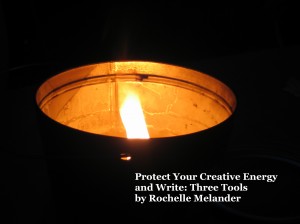Protect Your Creative Energy: Three Tools by Rochelle Melander
 Every single day she fought a war to get to her desk before her little bundle of energy had been dissipated, to push aside or cull through an intricate web of slight threads pulling her in a thousand different directions… —May Sarton, Mrs. Stevens Hears the Mermaids Singing
Every single day she fought a war to get to her desk before her little bundle of energy had been dissipated, to push aside or cull through an intricate web of slight threads pulling her in a thousand different directions… —May Sarton, Mrs. Stevens Hears the Mermaids Singing
May Sarton published Mrs. Stevens Hears the Mermaids Singing, a novel about a poet and writer in the early 60s, long before cell phones and the Internet. As a poet and novelist herself, Sarton knew that writers and artists had to fight through distraction to get to their desks and create before the threads of life pulled them toward both crucial and mundane tasks of the day.
The war to get to our desks—and stay there—involves many small battles. We struggle to turn off social media. We scuffle with our own egos: Does this work matter? Do I matter? Will anyone read this anyway? We battle our sense of duty: I should be taking care of stuff around the house. I need to be earning more. I should do more in the community. We confront the millions of ideas that float around our head: Oh, that’s a good idea! Perhaps this isn’t the right project? Maybe I should work on the other one for awhile.
As writers, we work hard to wade through all the distractions and write. We need to conserve our creative energy and spend it freely on writing. But when you can’t get to your desk first thing, what then? How do you protect what little energy you have? Try these three tools:
+Share less. Talking, tweeting, and facebooking about writing—and especially about our work in progress—spends our storytelling energy. Use your social time to share about other stuff—and save that creative buzz around your story for your writing time.
+Forget Feel Like. I rarely feel like doing the things I need to do—writing, exercising or even cooking dinner. Next time you get to your desk feeling no energy for writing—do it anyway. Like inspiration, our energy for writing often appears after we begin and not before.
+Ignore the critics. So, we already have this robust committee of critics living inside our heads. If you read online at all, you’ll run into plenty of writers who apply the famed Henny Penny/Chicken Little phrase to the writing world: The Sky is Falling! Oh My! No doubt you also have a few real-life naysayers to cope with. If you listen to even a smidgen of this oh-my-literature-is-in-danger and you’ll-never-succeed stuff, you’ll deplete your writing energy. Ignore it all and keep writing.
And a bonus tip: immerse yourself in art. It doesn’t matter what kind—music, dance, even sidewalk chalk drawings. When we nourish and nurture our creative spark, it grows into a vibrant flame. So spend at least a few of your free hours connecting with the work of other artists.
A final word. In case you forget this on the way to your desk today, your work matters. You matter. Write.








